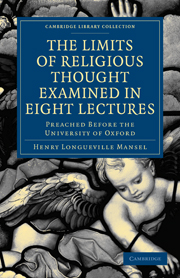 The Limits of Religious Thought Examined in Eight Lectures
The Limits of Religious Thought Examined in Eight Lectures Book contents
Summary
“O THOU THAT HEAREST PRAYER, UNTO THEE SHALL ALL FLESH COME.”
That the Finite cannot comprehend the Infinite, is a truth more frequently admitted in theory than applied in practice. It has been expressly asserted by men who, almost in the same breath, have proceeded to lay down canons of criticism, concerning the purpose of Revelation, and the truth or falsehood, importance or insignificance, of particular doctrines, on grounds which are tenable only on the supposition of a perfect and intimate knowledge of God's Nature and Counsels (1). Hence it becomes necessary to bring down the above truth from general to special statements;—to inquire more particularly wherein the limitation of man's faculties consists, and in what manner it exhibits itself in the products of thought. This task I endeavoured to accomplish in my last Lecture. To pursue the conclusion thus obtained to its legitimate consequences in relation to Theology, we must next inquire how the human mind, thus limited, is able to form the idea of a relation between man and God, and what is the nature of that conception of God which arises from the consciousness of this relation. The purpose of our inquiry is to ascertain the limits of religious thought; and for this purpose it is necessary to proceed from the limits of thought, and of human consciousness in general, to those particular forms of consciousness which, in thought or in some other mode, especially constitute the essence of Religion.
- Type
- Chapter
- Information
- The Limits of Religious Thought Examined in Eight LecturesPreached before the University of Oxford, in the Year M.DCCC.LVIII on the Foundation of the Late Rev. John Bampton, pp. 73 - 94Publisher: Cambridge University PressPrint publication year: 2009First published in: 1867
